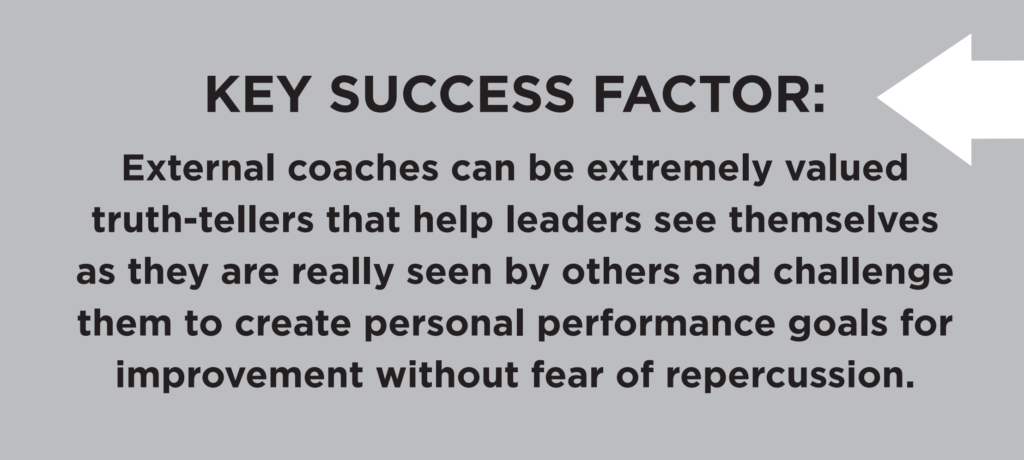Advantages and Disadvantages

When coaching first emerged as a valuable tool for organizational leadership development in the 1980s, few internal employees were asked to coach. Coaching was viewed as a singular, surgical development for specific executives independent of the larger organizational needs.
With coaching now seen as a valuable leadership development exercise from which almost all leaders can benefit, there is not surprisingly a greater focus on developing internal coaches to handle the workload. It is estimated that internal coaches provide over 10 percent of the current coaching offered by organizations, and that number is steadily growing.
Many companies are asking questions about making a serious investment in internal coaching. Are internal coaches better or worse than external coaches? What kind of employee makes the best internal coach? When should the organization bring in an external coach over an internal coach?
Both external and internal coaches have advantages and disadvantages, depending on organizational resources and goals. Following is a review of why organizations should use external coaches to meet their executive coaching needs:
External Coaches—Advantages
Perhaps the most compelling reason to seek an external executive coach is to obtain competence in coaching. Coaches become great at their craft by coaching scores or hundreds of clients over hundreds or thousands of hours. Within these many experiences, seasoned external coaches see a wide spectrum of clients with different challenges set in unique contexts. These numerous and varied experiences give them the ability to quickly understand their organizational clients and ask the right questions at the right time to meet desired goals.
Another good reason to engage an external coach is the perception of client privacy. Unlike internal coaches, external coaches are not tethered to the organization. They are not perceived as someone within the company who knows personal information about a client that could potentially be shared with others.
It’s important to point out that all coaches, whether external or internal, abide by a code of ethics that prevents them from disclosing client information. The challenge, however, comes from what the client believes might happen. For this reason, some executive clients are more comfortable only sharing personal information with an external coach.
External coaches also provide dispassionate objectivity. Said differently, this is the ability for the coach to “tell it like it is” and confront and challenge the client to dig deeper, view their real selves more honestly, or complete difficult assignments. An external coach has no political reason to hold back and “spin” their words by the very fact that they are not part of the organization.
Often, the higher position a client holds in an organization, the less likely it is for those around the client to disagree and push back on his or her ideas. External coaches can be extremely valued truth-tellers that help leaders see themselves as they are really seen by others and challenge them to create personal performance goals for improvement without fear of repercussion.

Though not a requirement for all companies, professional certification has become another major reason that organizations look outside for coaches. The industry has not yet standardized a certification process, but in recent years the International Coaching Federation (ICF) has become the largest recognized governing body. Many HR leaders prefer hiring coaches who have been ICF certified because it assures a minimum standard of training and competency level by the coach. ICF standards include a minimum number of training and coaching hours, standards of excellence for ethics, and a comprehensive examination.
Example:
Joanne was recently hired by a large multinational company to lead the customer service function. The CEO challenged her to quickly come up to speed and turn around the company’s abysmal customer service results. Joanne learned that her task would be exacerbated by the weak leadership team she inherited. Because of the immediacy of the situation, Joanne asked for help from an executive coach who could give her an independent viewpoint and help her solve the right problems in her first 90 days on the job. With help from the head of HR, Joanne hired an external executive coach who had considerable experience helping top executives through transitions. Finding an external coach also helped Joanne avoid any internal misperceptions or miscommunications.
External Coaches—Disadvantages
The primary reason for not considering external coaches is the higher cost when compared to internal resources. This is especially true at the higher levels. Most executive coaches who work with clients at the vice-president level and above will charge from $20,000 or more for a six-month engagement, with some in the high five or even six figures for executive vice president or CEO assignments.
Some organizations also avoid external coaches because they often lack deep company and industry knowledge, opting instead for internal coaches with that understanding. This is a controversial point among both HR functions and coaches. While deep company and business knowledge might be helpful, it is also true than an outsider might be better at helping their clients focus on their own behavioral objectives.
Finally, an external coach may take considerable time to search for, interview, and hire. This process may take a month or more and may require a significant time commitment by the HR or leadership development team.
The use of coaching within organizations continues to grow as it consistently delivers a positive return on investment and is a highly valued leadership development experience by those who experience it.
How can executive coaching help your organization develop your leaders to achieve better results faster?
##
This post includes material from the book, Accelerating Leadership, co-authored by Lance Hazzard and Eric T. Hicks, Ph.D., published in June 2019 and available as an e-book. The book also outlines considerations for organizations to establish and use internal executive coaching as well as when and how organizations come to use a hybrid approach of external coaching for executives and internal coaching for others being coached. Both Eric and Lance have served as internal and external executive coaches.
Lance Hazzard, CPCC, ACC, is a certified Intelligent Leadership Executive Coach helping people and organizations achieve success. He is Executive Coach and President at Oppnå® Executive & Achievement Coaching. More information can be found on the book, Lance and Oppnå® Coaching at the links below: